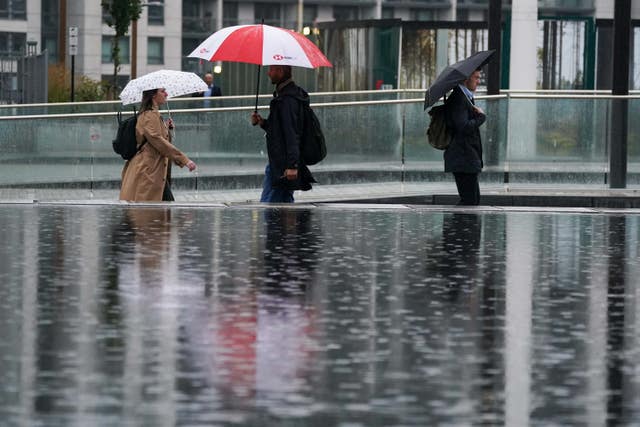
Last year was another unprecedented one in terms of extreme weather events across the UK amid the growing impact of climate change.
In the UK, 2023 was the second warmest year on record and brought storms, flooding, intense heatwaves and rising sea levels but will be a “cool year” compared to 2100 under predicted trajectories for the warming planet.
The PA news agency looks at some of the key statistics of the Met Office’s State Of The UK Climate 2023 report showing how the country is becoming hotter and wetter compared to the last century.
Temperatures
– 2023 was the second warmest year on record for the UK, with only 2022 warmer. It was 0.8C above the 1991–2020 average and 1.66C above 1961–1990.

– The UK recorded its warmest June on record by a wide margin, with a major North Atlantic marine heatwave a significant contributing factor.
– 30C was recorded in September in the UK on seven consecutive days, for the first time on record.
– Six years in the most recent decade (2014–2023) have been within the UK’s top-10 warmest. All 10 warmest years occurred in the 21st century.
– February, May, June and September 2023 were all ranked in the top-10 warmest months.
– The most recent decade was on average 0.42C warmer than the 1991–2020 average and 1.25C warmer than 1961–1990. It was the warmest 10-year period on record.
– The number of “warm” days (maximum 25C) has increased by 63%, the number of “hot” days (28C) has more than doubled and “very hot” days (30C) more than trebled for the most recent decade (2014–2023) compared with 1961–1990.
Precipitation
– 2023 was the seventh wettest year on record for the UK, with 113% of the 1991–2020 average. Large areas of the UK exceeded 125%.
– The UK recorded its wettest September to December period since 2000 due to persistently wet and unsettled weather, including the sequence of named storms from Agnes to Gerrit.

– March, July, October and December 2023 were all top-10 wettest months in the UK monthly rainfall series – the first year this has happened for four separate months.
– Five of the 10 wettest years for the UK have occurred in the 21st century.
– The most recent decade was 2% wetter than 1991–2020 and 10% wetter than 1961–1990.
– It also had around 20% more days of exceptional rainfall compared to the 1961-1990 period.
– UK winters for the most recent decade (2014–2023) have been 9% wetter than 1991–2020 and 24% wetter than 1961–1990, with smaller increases in summer and autumn and none in spring.
– Scotland had its wettest two-day period on record in October. England and Wales combined had its third wettest three-day period on record in October.
Snow and frost
– While there were some snow events in 2023 (and several recent years were less snowy), overall this was still a much less snowy year than most other years since the 1960s.

– In recent years, widespread and substantial snow events have occurred in 2009, 2010, 2013, 2018 and 2021, but their number and severity have generally declined since the 1960s.
– The most recent decade had over a week fewer ground frosts per year than the 1991–2020 average and almost a month fewer than 1961–1990.
Sunshine
– 2023 sunshine for the UK was 102% of the 1991–2020 average.
– June was the sunniest month of the year and the UK’s sunniest calendar month since May 2020.
– The 2014-2023 decade has been the sunniest 10-year period in the UK.
– The most recent decade had for the UK on average 4% more hours of bright sunshine per year than the 1991–2020 average and 9% more than 1961–1990.


Why are you making commenting on The National only available to subscribers?
We know there are thousands of National readers who want to debate, argue and go back and forth in the comments section of our stories. We’ve got the most informed readers in Scotland, asking each other the big questions about the future of our country.
Unfortunately, though, these important debates are being spoiled by a vocal minority of trolls who aren’t really interested in the issues, try to derail the conversations, register under fake names, and post vile abuse.
So that’s why we’ve decided to make the ability to comment only available to our paying subscribers. That way, all the trolls who post abuse on our website will have to pay if they want to join the debate – and risk a permanent ban from the account that they subscribe with.
The conversation will go back to what it should be about – people who care passionately about the issues, but disagree constructively on what we should do about them. Let’s get that debate started!
Callum Baird, Editor of The National
Comments: Our rules
We want our comments to be a lively and valuable part of our community - a place where readers can debate and engage with the most important local issues. The ability to comment on our stories is a privilege, not a right, however, and that privilege may be withdrawn if it is abused or misused.
Please report any comments that break our rules.
Read the rules hereLast Updated:
Report this comment Cancel